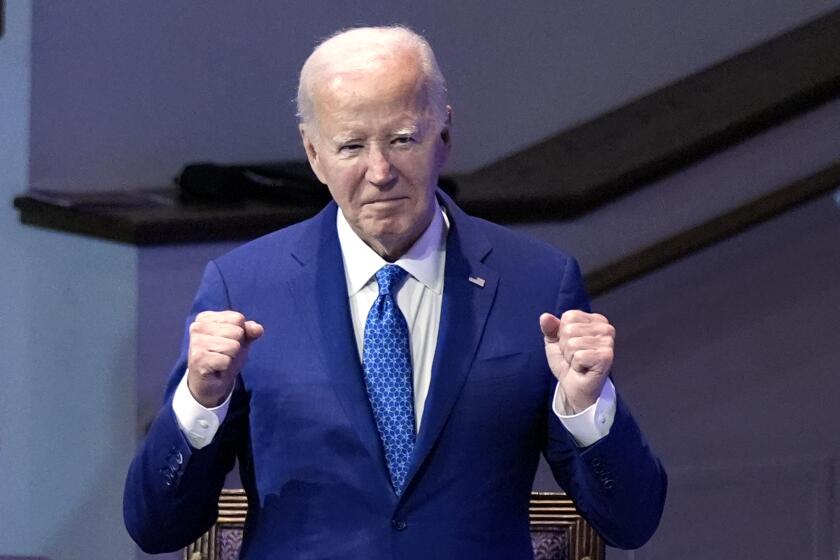DNA Study Shows Jefferson Fathered His Slave’s Child
Thomas Jefferson, author of the Declaration of Independence and third president of the fledgling United States, almost certainly fathered a child with a slave mistress at his Monticello plantation, scientists who analyzed genetic material collected from his living descendants have concluded.
The new evidence, made public Saturday, sheds the first reliable scientific light on an unusually emotional controversy over paternity that has simmered for almost two centuries.
The matter of Jefferson’s long relationship with a mixed-race slave named Sally Hemings is of more than scholarly interest. As embodied in his hundreds of white and unacknowledged black descendants, several historians said, Jefferson’s divided family tree today personifies troubling matters of race, slavery, sexuality and hypocrisy that root in the earliest events of the country Jefferson helped to found.
The new research reveals, within the limits of scientific certainty, that Jefferson enslaved the mother of his children and the offspring she bore him. To complicate matters, historians generally agree that Sally Hemings was the half-sister of Jefferson’s wife.
“This is quite stunning news . . . very shocking,” said UCLA historian Joyce Appleby, an expert on the Jeffersonian era and a past president of the American Historical Assn.
Historian Gary Nash, an authority at UCLA on early America and the author of a forthcoming book on the history of interracial relationships, called the finding “extraordinary.”
Jefferson met the 14-year-old Hemings in 1786 in Paris, where she was a house slave who took care of his youngest daughter. Rumors over Jefferson’s relationship with Hemings, who eventually bore at least five children, arose as early as 1802--in the second year of his presidency.
During his lifetime, Jefferson never confirmed or explicitly denied allegations that he had fathered several children with her in the years after his wife’s death in 1782. There is nothing in the historical record that proves the relationship existed or, if it did, whether it was forced or consensual.
In the generations since, historians have argued passionately over whether the red-headed Virginian who embodied so many of the best qualities of the new nation also encompassed perhaps its worst as well.
Collecting the Evidence
He was a slave owner who early in his career tried to abolish slavery. Even so, he freed few of his own slaves while other major slaveholders in Virginia freed thousands during the same period. He was an inspirational revolutionary who believed fervently in the equality of all men, but who also held that blacks and whites were separate peoples.
To settle a question that generations of historical debate has not, retired pathologist Eugene Foster in Charlottesville, Va., recently gathered DNA samples from Jefferson’s known white descendants and from a group of African Americans who many believe also descended from Jefferson.
Foster collected samples from 13 black and white descendants, as well as a control group, coding them with random numbers to ensure that laboratory technicians would not know the source of each DNA sample. Because Jefferson had no surviving sons, Foster collected material from the male descendants of Jefferson’s brother, with whom he would have shared the same Y chromosome inherited from their father.
So cautious was Foster that he hand-carried the material to England for the genetic analysis rather than check it with his other baggage. “That suitcase was never out of my sight, not ever, ever,” he said.
Through analyzing genetic variations in the Y chromosome, which is inherited largely unchanged through the male line, geneticists at Oxford University, the University of Leicester in England and Leiden University in the Netherlands determined to their satisfaction that Jefferson was the father of Sally Hemings’ last son--Eston Hemings Jefferson.
The researchers looked at variations in 19 locations along the Y chromosome and found that Jefferson’s genetic characteristics were quite rare. Indeed, a comparison with a sample of 670 Europeans and 1,200 people worldwide turned up no matches, the scientists said. Jefferson’s genetic makeup matched perfectly, however, with Eston’s male descendant.
The researchers were able to conclusively eliminate the possibility that one of Jefferson’s maternal nephews might have fathered the children, as some historians have suggested. At the same time, they also ruled out the possibility that Jefferson fathered Hemings’ oldest son, Thomas Woodson, whom many had considered the most likely child of the union.
“A lot of very careful work went into this. We knew there would be all kinds of questions and controversy,” Foster said. “I suppose there will be some people who will be angry.”
However, “I do believe it is close to the first piece of objective evidence that has been brought to bear on the controversy,” he said.
A formal research paper is to be published this week in the journal Nature.
“It certainly provides very compelling evidence that Thomas Jefferson and Sally Hemings did indeed have a sexual liaison that produced at least one or more children,” said Eric S. Lander, director of the Center for Genome Research at the Whitehead Institute for Biomedical Research in Cambridge, Mass., who has reviewed the scientific findings.
“In any scientific study, one keeps in mind some doubt, but this now approaches near certainty,” Lander said. “If this [answer] provides an opportunity for a dialogue about the secret history between whites and blacks, then this is a good occasion.”
Changing the Face of History
Without question, the research will make a deep national impression, several historians said, because Jefferson is nothing less than an American icon. His profile is carved in Mount Rushmore. His face is stamped on every nickel and printed on every $2 bill. His marble memorial on the Tidal Basin in Washington, D.C., is a destination for visitors by the millions every year who stop to contemplate his personal and political legacy.
“If America is going to deal with the horribly difficult problem of race relations, we have to start by coming face to face with our past, and Jefferson is a big part of that past,” said constitutional scholar Paul Finkelman at University of Akron School of Law, author of “Slavery and the Founders: Race and Liberty in the Age of Jefferson.”
Certainly, Jefferson was in public vehemently opposed to miscegenation, and his attitudes toward slavery in many ways reflected the ambivalence of the country’s founding fathers about racial matters.
“I think [the research] just increases our sense of how deeply puzzled, perplexed and troubled he was about slavery,” said Appleby, who studies Jefferson’s political role in America and his career as a statesman. “What is so interesting is how deep the vicious tentacles of slavery sank into this man.”
It is well documented that he benefited from slave labor and never hesitated to sell his slaves to support his lifestyle. “When he needed another case of Bordeaux, another shipment of books, more paintings from France, or any of the many other luxuries he could not live without, Jefferson simply sent someone’s son or daughter off to the slave market,” Finkelman said.
Yet Jefferson’s misgivings about slavery were so strong and his perception of its pernicious effects so clear that he wrote in 1787, not too long after he met Hemings:
“The whole commerce between master and slave is a perpetual exercise of the most boisterous passions, the most unremitting despotisms on the one part, and degrading submission on the other. Our children see this, and learn to imitate it; for man is an imitative animal. . . . The man must be a prodigy who can retain his manners and morals undepraved by such circumstances. . . . I tremble for my country when I reflect that God is just: that his justice cannot sleep forever.”
More to Read
Start your day right
Sign up for Essential California for news, features and recommendations from the L.A. Times and beyond in your inbox six days a week.
You may occasionally receive promotional content from the Los Angeles Times.






